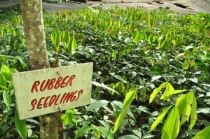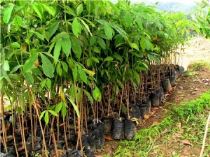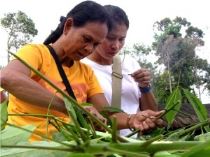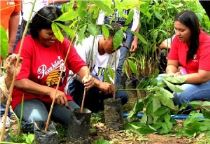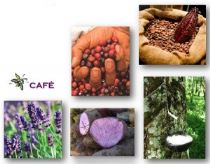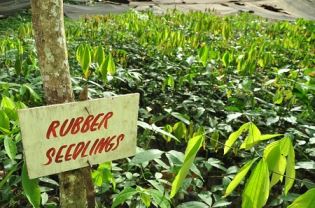
(pictures taken from the internet) Photo 8 – (from left) Minesite agriculturist Carlos Tuerco, IP beneficiary Bonifacio Patoh, and CReDO Manager Joel Alasco.
enterprises such as rubber plantations…
A few years back, residents of Canatuan, Brgy. Tabayo, Siocon, Zamboanga del Norte were unsure of their future when asked how they would see themselves after the mining operations in their area closes down.
And then, TVI Resource Development (Phils.) Inc. (TVIRD) introduced to them the Sustainable Agricultural Land Technology (SALT) project under the Sustainable Development Management Program (SDMP). This is a capacity-building project aimed to engage the Indigenous People (IPs) in the area to plant agricultural trees and crops which would be sustainable in the future.
The SALT project was established in 2009, giving the Subanon community a brighter hope of enduring livelihood. Through the Community Relations and Development Office (CReDO), SALT introduced the rubber tree plantation technology. Four clusters within the Certificate of Ancestral Domain Title (CADT) area created a Farmers’ Organization which tapped the local farmers in the neighborhood.
The clusters appeared in four different barangays and sitios of Paduan, Solonsongan, Tanuman, and Tabayo. Each cluster formed its own rules and regulations in implementing the rubber tree plantation project.
“Three things to consider before they will be provided with the seedlings. First is to have their own land area where they can plant. Second is to undergo a skills-training seminar on the management of the plantation. And last, they have to make sure that the area is well-prepared and clean,” Carlos Tuerco, a mine site agriculturist, stressed.
“I am part of the first batch since the project started in 2009. TVIRD provided us with two things—the rubber seedlings and the technology to grow these on our own,” shared Bonifacio Patoh, a long-time Subanon resident in Tabayo.
TVIRD committed 500 seedlings per farmer beneficiary. To date, there are 186 household beneficiaries and 63,000 seedlings planted covering more than 100 hectares. Rubber seedlings fully mature in about seven to ten years.
“This is our first step in ensuring the community of sustainability. With the company preparing for mine closure by the end of 2013, our vision for a sustainable life after mining is an agri-enterprise business model. The advantage of this model is that we can implement the program immediately ahead of the final mine closure,” emphasized CReDO Manager Joel Alasco.
“We term it CAFÉ—Canatuan Agri-Forestry Enterprise,” TVIRD CEO Cliff James announced during the Philippine Mining Congress. “This is a vision to redevelop the Canatuan MPSA (Mineral Production Sharing Agreement) into a local or regional center. The past progressive rehabilitation programs and the skills developed by the environment and community development departments can be leveraged to provide agricultural services, nursery production, training and education within the CADT and local/regional areas,” he explained.
The Canatuan MPSA is 508 hectares with only 200 hectares being disturbed.
The operation of CAFÉ will consist of a core services sector based in Canatuan—the upstream and downstream services. The upstream services will consist of mine closure objectives, development of agricultural education and research programs; re-introduction of the living traditions of tribal and cultural herbs and medicines; and the development of high-value cash crops within the rehabilitated areas.
The downstream services will focus on nursery and seedling development for agricultural enterprises within the CADT area and the local and regional ones. This will involve working with the local farmer clusters, providing them with post-harvest facilities, and establishing a mechanism for the sale and distribution of their products.
“The agri-enterprise will focus on crops such as rubber, cacao, coffee, palm oil, lavender, citronella and purple yams (ube),” Alasco said. “One way of helping them achieve sustainability is by tying up with a company that will last long,” he continued.
TVIRD is currently in negotiations with a potential partner-investor to establish a cacao-growing operation and have had initial discussions with other companies for the sale of the products.
“Besides rubber seedlings, we now also prepare coffee for nursery and propagation. Cacao will come next,” Alasco added.
All these were enabled when the company engaged three organizations to guide them and to provide studies on how to make things work. The Brain Trust Incorporated and the University of Asia and the Pacific (UA&P) both provided the company with more detailed business plans. The Gawad Kalinga (GK) provided ideas for developing people and communities as well as developing businesses that sustain them.
“The vision of the company for us broadens the horizons for me, my family, and the whole community,” Patoh shared after learning about the life after mine programs of TVIRD. “With the technology and materials provided to us, it is just right that we also do our part in sustaining and giving importance to what is given to us,” he added.
“We are excited about this CAFÉ program. The future is clear now,” expressed Lydia Dandana, a Subanon elder in Canatuan.
“We at TVIRD believe that engaging in agricultural projects both during and after mining makes economic sense in our case and transforms sustainability from a concept to reality,” Cliff James disclosed. “After all, it’s not a question of whether we can be sustainable, but rather, what actions are we taking now to shape the future,” he concluded.

